江大缺点外教作业
- 格式:ppt
- 大小:2.84 MB
- 文档页数:7
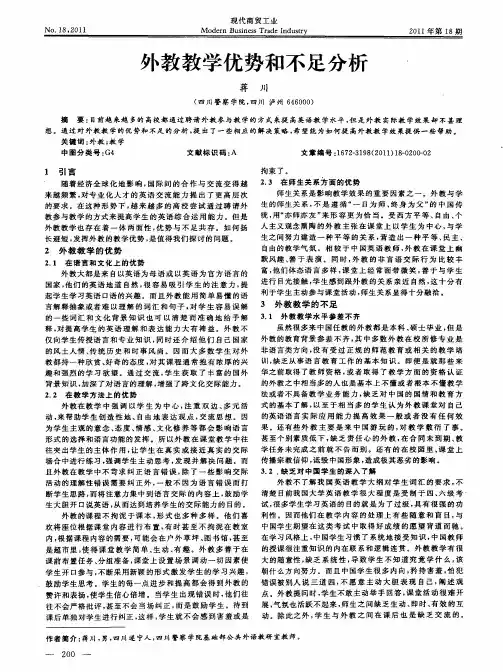
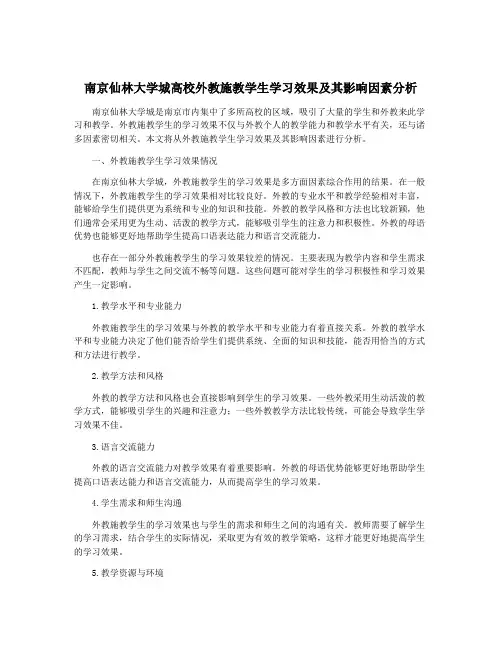
南京仙林大学城高校外教施教学生学习效果及其影响因素分析南京仙林大学城是南京市内集中了多所高校的区域,吸引了大量的学生和外教来此学习和教学。
外教施教学生的学习效果不仅与外教个人的教学能力和教学水平有关,还与诸多因素密切相关。
本文将从外教施教学生学习效果及其影响因素进行分析。
一、外教施教学生学习效果情况在南京仙林大学城,外教施教学生的学习效果是多方面因素综合作用的结果。
在一般情况下,外教施教学生的学习效果相对比较良好。
外教的专业水平和教学经验相对丰富,能够给学生们提供更为系统和专业的知识和技能。
外教的教学风格和方法也比较新颖,他们通常会采用更为生动、活泼的教学方式,能够吸引学生的注意力和积极性。
外教的母语优势也能够更好地帮助学生提高口语表达能力和语言交流能力。
也存在一部分外教施教学生的学习效果较差的情况。
主要表现为教学内容和学生需求不匹配,教师与学生之间交流不畅等问题。
这些问题可能对学生的学习积极性和学习效果产生一定影响。
1.教学水平和专业能力外教施教学生的学习效果与外教的教学水平和专业能力有着直接关系。
外教的教学水平和专业能力决定了他们能否给学生们提供系统、全面的知识和技能,能否用恰当的方式和方法进行教学。
2.教学方法和风格外教的教学方法和风格也会直接影响到学生的学习效果。
一些外教采用生动活泼的教学方式,能够吸引学生的兴趣和注意力;一些外教教学方法比较传统,可能会导致学生学习效果不佳。
3.语言交流能力外教的语言交流能力对教学效果有着重要影响。
外教的母语优势能够更好地帮助学生提高口语表达能力和语言交流能力,从而提高学生的学习效果。
4.学生需求和师生沟通外教施教学生的学习效果也与学生的需求和师生之间的沟通有关。
教师需要了解学生的学习需求,结合学生的实际情况,采取更为有效的教学策略,这样才能更好地提高学生的学习效果。
5.教学资源与环境教学资源与环境的优劣也会直接影响到外教施教学生的学习效果。
学校是否提供良好的教学资源和教学环境,以及学生是否能够充分利用这些资源和环境,都会对学习效果产生一定影响。
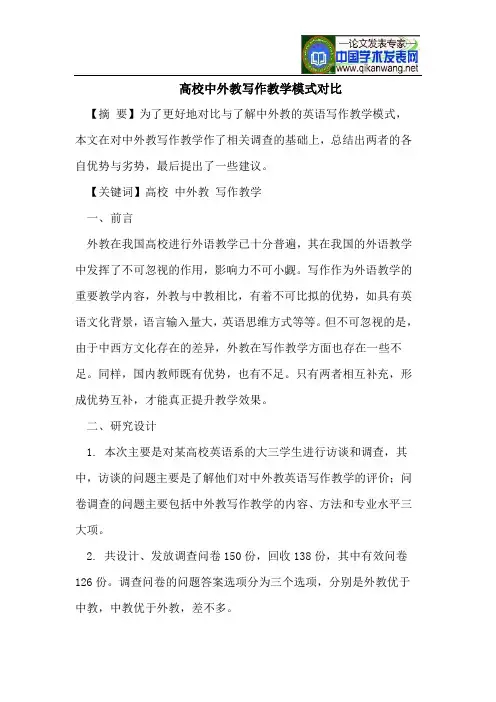
高校中外教写作教学模式对比【摘要】为了更好地对比与了解中外教的英语写作教学模式,本文在对中外教写作教学作了相关调查的基础上,总结出两者的各自优势与劣势,最后提出了一些建议。
【关键词】高校中外教写作教学一、前言外教在我国高校进行外语教学已十分普遍,其在我国的外语教学中发挥了不可忽视的作用,影响力不可小觑。
写作作为外语教学的重要教学内容,外教与中教相比,有着不可比拟的优势,如具有英语文化背景,语言输入量大,英语思维方式等等。
但不可忽视的是,由于中西方文化存在的差异,外教在写作教学方面也存在一些不足。
同样,国内教师既有优势,也有不足。
只有两者相互补充,形成优势互补,才能真正提升教学效果。
二、研究设计1. 本次主要是对某高校英语系的大三学生进行访谈和调查,其中,访谈的问题主要是了解他们对中外教英语写作教学的评价;问卷调查的问题主要包括中外教写作教学的内容、方法和专业水平三大项。
2. 共设计、发放调查问卷150份,回收138份,其中有效问卷126份。
调查问卷的问题答案选项分为三个选项,分别是外教优于中教,中教优于外教,差不多。
3. 对于回收回来的138份有效问卷,笔者运用数理统计法对回收的126份有效问卷进行统计,以每题所选人数占总人数的百分比来作为统计结果。
三、调查结果与分析通过访谈和问卷调查,笔者分别对访谈的结果和调查问卷进行了统计分析。
1. 关于英语写作的教学内容,调查统计发现,大多学生认为外教的教学内容较为丰富,首先,在对教材的依赖程度方面,有38.4%的学生认为外教优于中教,36.2%的学生认为中教优于外教,这主要是因为外教与中教相比,较能找到学生普遍关注的话题,如学生十分关注的如同居、结婚等话题;其次在课外知识讲授方面,71.8%的学生认为外教优于中教;最后,而在教学内容上,有52.8%学生认为中教优于外教,这主要是因为中教与外教相比,经过专业、系统的写作教学训练。
2. 关于教学方法(如表2),学生认为中教的写作教学教具系统性,而外教的写作教学教具开放性。
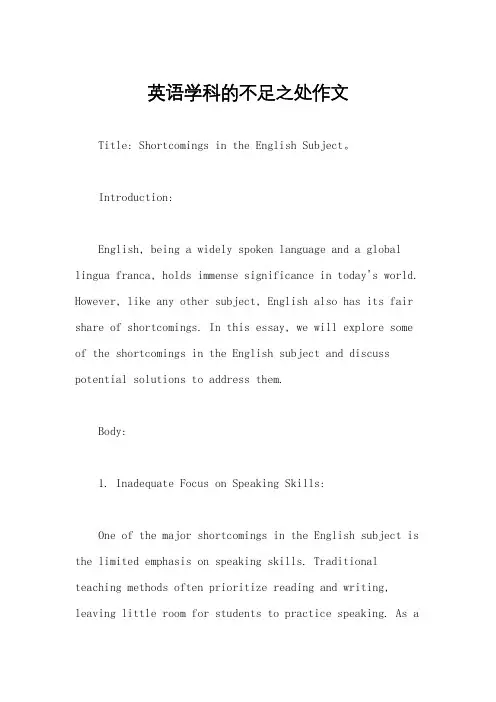
英语学科的不足之处作文Title: Shortcomings in the English Subject。
Introduction:English, being a widely spoken language and a global lingua franca, holds immense significance in today's world. However, like any other subject, English also has its fair share of shortcomings. In this essay, we will explore some of the shortcomings in the English subject and discuss potential solutions to address them.Body:1. Inadequate Focus on Speaking Skills:One of the major shortcomings in the English subject is the limited emphasis on speaking skills. Traditional teaching methods often prioritize reading and writing, leaving little room for students to practice speaking. As aresult, many students struggle to communicate effectivelyin English, despite having a strong grasp of grammar and vocabulary.Solution: To overcome this shortcoming, educators should incorporate more speaking activities into the English curriculum. Classroom discussions, debates, androle-plays can provide students with ample opportunities to improve their speaking skills. Additionally, language labs equipped with audio-visual aids can be used to enhance pronunciation and fluency.2. Insufficient Cultural Integration:Another shortcoming is the lack of cultural integration in English language learning. English is not just a language; it is deeply intertwined with the culture, traditions, and history of English-speaking countries. However, traditional English textbooks often focus solely on grammar rules and vocabulary, neglecting the cultural aspects.Solution: Educators should incorporate cultural elements into the English curriculum to provide students with a holistic understanding of the language. This can be achieved by including literature, films, and music from English-speaking countries, as well as organizing cultural exchange programs or inviting guest speakers from different cultures.3. Limited Authentic Materials:Many English textbooks and resources used in classrooms often lack authentic materials. Instead, they contain simplified texts or contrived dialogues that do not reflect real-life language usage. This can hinder students' ability to understand and communicate effectively in real-world situations.Solution: Teachers should supplement the curriculum with authentic materials such as newspapers, magazines, podcasts, and online resources. These materials expose students to natural language usage, idiomatic expressions, and current affairs, enabling them to develop a betterunderstanding of English in its authentic context.4. Overemphasis on Grammar:While grammar is an essential component of language learning, an overemphasis on grammar rules can hinder students' fluency and creativity. Students may become too focused on using correct grammar structures, sacrificing their ability to express ideas freely.Solution: Teachers should adopt a balanced approach to teaching grammar, placing equal importance on fluency and accuracy. Encouraging students to engage in creative writing, storytelling, and discussions can help them develop fluency while gradually improving their grammar skills.Conclusion:English, as a subject, has several shortcomings that need to be addressed for effective language learning. By focusing on speaking skills, integrating culture,incorporating authentic materials, and adopting a balanced approach to teaching grammar, educators can help students develop a well-rounded understanding of the English language. It is crucial to continuously adapt teaching methods to meet the evolving needs of students and equip them with the necessary skills to communicate confidently in English.。
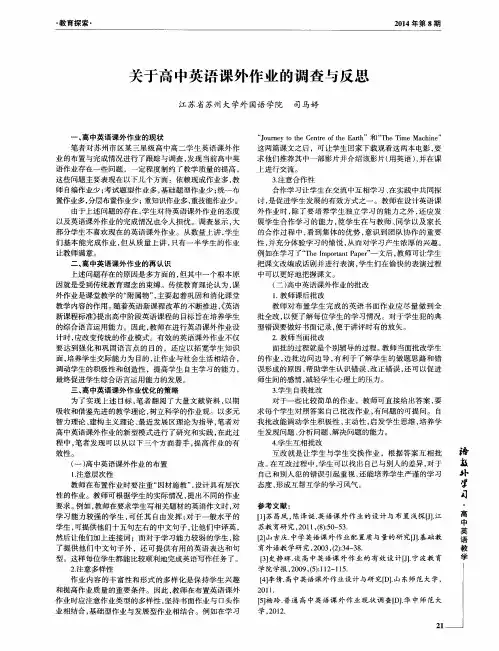
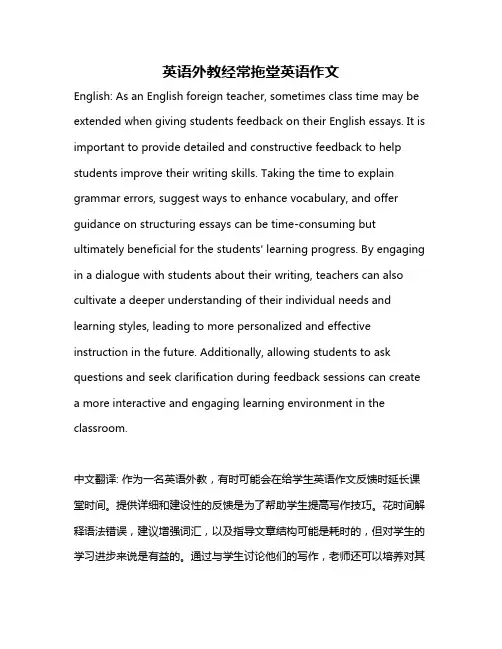
英语外教经常拖堂英语作文English: As an English foreign teacher, sometimes class time may be extended when giving students feedback on their English essays. It is important to provide detailed and constructive feedback to help students improve their writing skills. Taking the time to explain grammar errors, suggest ways to enhance vocabulary, and offer guidance on structuring essays can be time-consuming but ultimately beneficial for the students' learning progress. By engaging in a dialogue with students about their writing, teachers can also cultivate a deeper understanding of their individual needs and learning styles, leading to more personalized and effective instruction in the future. Additionally, allowing students to ask questions and seek clarification during feedback sessions can create a more interactive and engaging learning environment in the classroom.中文翻译: 作为一名英语外教,有时可能会在给学生英语作文反馈时延长课堂时间。
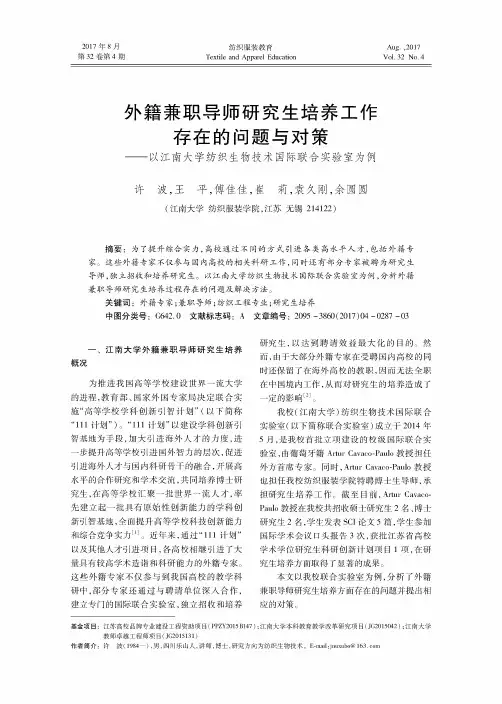
2017年8月第32卷第4期纺织服装教育Textile and Apparel EducationAug. ,2017Vol.32 No.4外籍兼职导师研究生培养工作存在的问题与对策—以江南大学纺织生物技术国际联合实验室为例许波,王平,傅佳佳,崔莉,袁久刚,余圆圆(江南大学纺织服装学院,江苏无锡214122)摘要:为了提升综合实力,高校通过不同的方式引进各类高水平人才,包括外籍专 家。
这些外籍专家不仅参与国内高校的相关科研工作,同时还有部分专家被聘为研究生 导师,独立招收和培养研究生。
以江南大学纺织生物技术国际联合实验室为例,分析外籍 兼职导师研究生培养过程存在的问题及解决方法。
关键词:外籍专家;兼职导师;纺织工程专业;研究生培养中图分类号:G642.0文献标志码:A文章编号:2095 -3860(2017)04 -0287 -03一、江南大学外籍兼职导师研究生培养概况为推进我国高等学校建设世界一流大学 的进程,教育部、国家外国专家局决定联合实 施“高等学校学科创新引智计划*(以下简称 “111计划*)。
“111计划”以建设学科创新引 智基地为手段,加大引进海外人才的力度,进 一步提升高等学校引进国外智力的层次,促进 引进海外人才与国内科研骨干的融合,开展高 水平的合作研究和学术交流,共同培养博士研 究生,在高等学校汇聚一批世界一流人才,率 先建立起一批具有原始性创新能力的学科创 新引智基地,全面提升高等学校科技创新能力 和综合竞争实力[10。
近年来,通过“111计划”以及其他人才引进项目,各高校相继引进了大 量具有较高学术造诣和科研能力的外籍专家。
这些外籍专家不仅参与到我国高校的教学科 研中,部分专家还通过与聘请单位深入合作,建立专门的国际联合实验室,独立招收和培养研究生,以达到聘请效益最大化的目的。
然 而,由于大部分外籍专家在受聘国内高校的同 时还保留了在海外高校的教职,因而无法全职 在中国境内工作,从而对研究生的培养造成了一定的影响[2]。
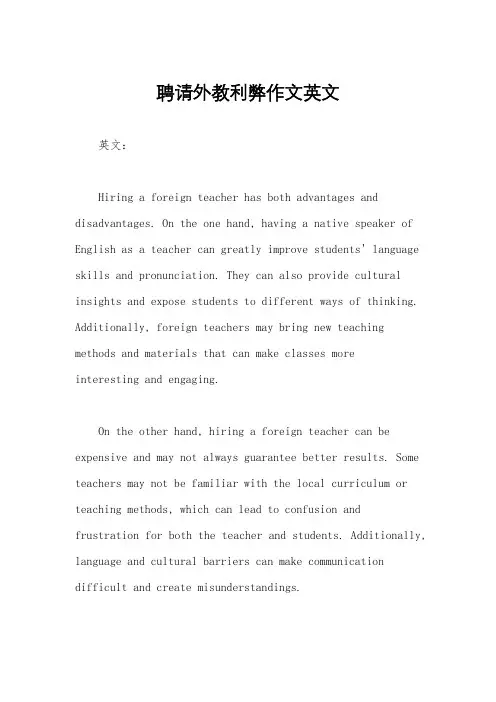
聘请外教利弊作文英文英文:Hiring a foreign teacher has both advantages and disadvantages. On the one hand, having a native speaker of English as a teacher can greatly improve students' language skills and pronunciation. They can also provide cultural insights and expose students to different ways of thinking. Additionally, foreign teachers may bring new teaching methods and materials that can make classes moreinteresting and engaging.On the other hand, hiring a foreign teacher can be expensive and may not always guarantee better results. Some teachers may not be familiar with the local curriculum or teaching methods, which can lead to confusion andfrustration for both the teacher and students. Additionally, language and cultural barriers can make communicationdifficult and create misunderstandings.Personally, I believe that hiring a foreign teacher can be beneficial if done correctly. It is important to carefully select a teacher who is qualified and experienced in teaching in the local context. It is also important to provide support and resources to help the teacher adapt to the new environment and understand the local culture and teaching methods.For example, when I was studying English in China, my school hired a British teacher who was very knowledgeable and experienced. She brought new teaching materials and methods that made classes more engaging and interactive. However, she also took the time to learn about Chinese culture and teaching methods, which helped her to better understand and connect with her students.中文:聘请外教有优点也有缺点。
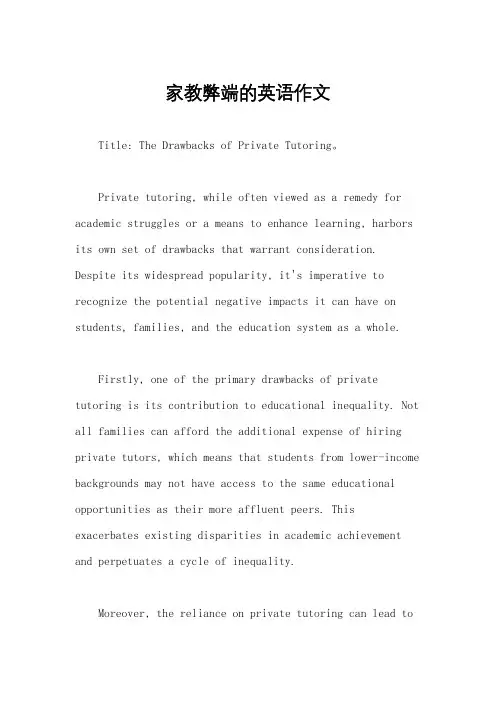
家教弊端的英语作文Title: The Drawbacks of Private Tutoring。
Private tutoring, while often viewed as a remedy for academic struggles or a means to enhance learning, harbors its own set of drawbacks that warrant consideration. Despite its widespread popularity, it's imperative to recognize the potential negative impacts it can have on students, families, and the education system as a whole.Firstly, one of the primary drawbacks of private tutoring is its contribution to educational inequality. Not all families can afford the additional expense of hiring private tutors, which means that students from lower-income backgrounds may not have access to the same educational opportunities as their more affluent peers. This exacerbates existing disparities in academic achievement and perpetuates a cycle of inequality.Moreover, the reliance on private tutoring can lead tooveremphasis on academic performance at the expense of holistic development. Students may feel pressured to excel academically to justify the investment made by their parents in hiring tutors. Consequently, other aspects of their personal growth, such as social skills, creativity, and emotional intelligence, may be neglected. This narrow focus on grades and test scores can undermine the development of well-rounded individuals.Furthermore, private tutoring can foster dependency rather than independence in students. When students become accustomed to receiving personalized attention and guidance from tutors, they may struggle to develop self-directed learning skills. This reliance on external support can hinder their ability to think critically, solve problems independently, and take ownership of their own academic journey. In the long run, this dependency may impede their academic and professional success.Another concern is the potential for private tutoring to exacerbate academic pressure and stress among students. In addition to the demands of schoolwork, students enrolledin private tutoring may feel overwhelmed by the additional workload and expectations placed upon them. This can leadto heightened anxiety, burnout, and even mental health issues. The pursuit of academic excellence should not comeat the expense of students' well-being.Moreover, the proliferation of private tutoring can undermine the effectiveness of mainstream education systems. When students rely heavily on private tutors to supplement their learning, it raises questions about the quality and adequacy of the education provided by schools. It also places undue pressure on teachers to compete with private tutors, potentially leading to a focus on teaching to the test rather than fostering genuine understanding andcritical thinking skills.In conclusion, while private tutoring may offer short-term benefits in terms of academic improvement, it is not without its drawbacks. From exacerbating educational inequality to fostering dependency and stress among students, the reliance on private tutoring posessignificant challenges to the education system. It isessential to address these issues and strive towards a more equitable and holistic approach to learning thatprioritizes the well-being and development of all students.。
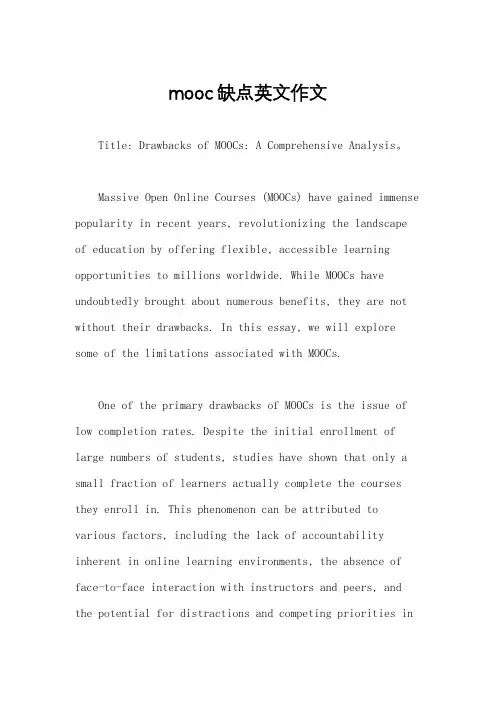
mooc缺点英文作文Title: Drawbacks of MOOCs: A Comprehensive Analysis。
Massive Open Online Courses (MOOCs) have gained immense popularity in recent years, revolutionizing the landscape of education by offering flexible, accessible learning opportunities to millions worldwide. While MOOCs have undoubtedly brought about numerous benefits, they are not without their drawbacks. In this essay, we will explore some of the limitations associated with MOOCs.One of the primary drawbacks of MOOCs is the issue of low completion rates. Despite the initial enrollment of large numbers of students, studies have shown that only a small fraction of learners actually complete the courses they enroll in. This phenomenon can be attributed to various factors, including the lack of accountability inherent in online learning environments, the absence of face-to-face interaction with instructors and peers, and the potential for distractions and competing priorities inlearners' lives.Moreover, MOOCs often face challenges in providing personalized learning experiences. Unlike traditional classroom settings where instructors can tailor their teaching methods to suit the needs of individual students, MOOCs typically employ a one-size-fits-all approach to course delivery. This lack of customization can hinder the effectiveness of learning, particularly for students with diverse learning styles, backgrounds, and skill levels.Another significant drawback of MOOCs is the limited opportunities for hands-on, practical learning experiences. While MOOCs excel in delivering theoretical knowledge and conceptual understanding, they often fall short when it comes to facilitating hands-on application and skill development. Certain subjects, such as those in the STEM (Science, Technology, Engineering, and Mathematics) fields, require hands-on experimentation and laboratory work, which are difficult to replicate in an online format.Furthermore, MOOCs may exacerbate existing inequalitiesin access to education. While they have the potential to reach learners in remote or underserved areas, individuals lacking reliable internet access or technological devices may be excluded from participating in MOOCs. Additionally, language barriers and cultural differences can pose challenges for learners from non-English-speaking backgrounds, limiting their ability to fully engage with course materials.Another concern associated with MOOCs is the issue of credentialing and accreditation. While some MOOC platforms offer certificates or badges upon course completion, the value and recognition of these credentials vary widely among employers and educational institutions. As a result, learners may invest time and effort in completing MOOCs only to find that their achievements are not adequately recognized or respected in the job market or academic sphere.Finally, MOOCs face ongoing challenges related to maintaining engagement and motivation among learners. Without the structure and accountability provided bytraditional classroom settings, some students may struggleto stay motivated and committed to their studies. Additionally, the absence of real-time feedback and support from instructors can lead to feelings of isolation and disconnection, further dampening learners' enthusiasm and engagement.In conclusion, while MOOCs offer numerous advantages in terms of accessibility, flexibility, and cost-effectiveness, they also suffer from several significant drawbacks. These include low completion rates, a lack of personalizedlearning experiences, limited opportunities for hands-on learning, inequalities in access to education, issues with credentialing and accreditation, and challenges in maintaining learner engagement and motivation. Addressing these limitations will require ongoing efforts from educators, policymakers, and technology developers toensure that MOOCs fulfill their potential as atransformative force in education.。
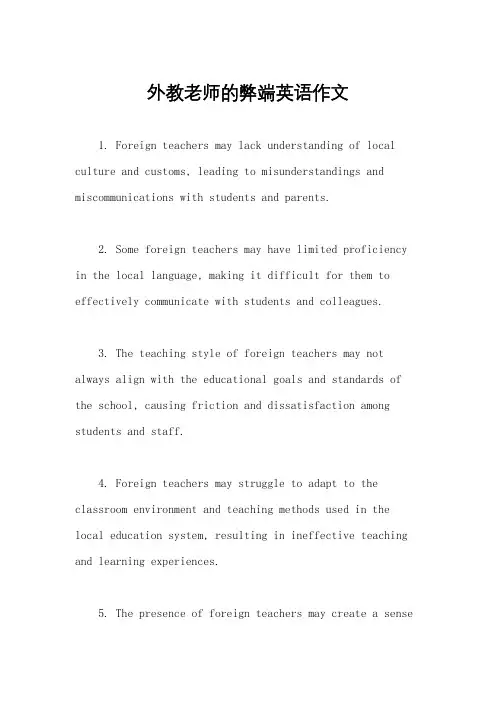
外教老师的弊端英语作文1. Foreign teachers may lack understanding of local culture and customs, leading to misunderstandings and miscommunications with students and parents.2. Some foreign teachers may have limited proficiency in the local language, making it difficult for them to effectively communicate with students and colleagues.3. The teaching style of foreign teachers may not always align with the educational goals and standards of the school, causing friction and dissatisfaction among students and staff.4. Foreign teachers may struggle to adapt to the classroom environment and teaching methods used in the local education system, resulting in ineffective teaching and learning experiences.5. The presence of foreign teachers may create a senseof hierarchy and favoritism among students, leading to division and resentment within the classroom.6. Some foreign teachers may lack proper training and qualifications, which can impact the quality of education they provide to students.7. The reliance on foreign teachers may limit the opportunities for local teachers to develop their own skills and expertise in the field of education.8. The turnover rate of foreign teachers can be high, causing disruptions in the learning process and stability within the school community.。
外教教学优势和不足分析目前越来越多的高校都通过聘请外教参与教学的方式来提高英语教学水平,但是外教实际教学效果却不甚理想。
通过对外教教学的优势和不足的分析,提出了一些相应的解决策略,希望能为如何提高外教教学效果提供一些帮助。
标签:外教;教学1 引言随着经济全球化地影响,国际间的合作与交流变得越来越频繁,对专业化人才的英语交流能力提出了更高层次的要求。
在这种形势下,越来越多的高校尝试通过聘请外教参与教学的方式来提高学生的英语综合运用能力。
但是外教教学也存在着一体两面性,优势与不足共存。
如何扬长避短,发挥外教的教学优势,是值得我们探讨的问题。
2 外教教学的优势2.1 在语言和文化上的优势外教大都是来自以英语为母语或以英语为官方语言的国家,他们的英语地道自然,很容易吸引学生的注意力,提起学生学习英语口语的兴趣。
而且外教能用简单易懂的语言解释抽象或者难以理解的词汇和句子,对学生容易误解的一些词汇和文化背景知识也可以清楚而准确地给予解释,对提高学生的英语理解和表达能力大有裨益。
外教不仅向学生传授语言和专业知识,同时还介绍他们自己国家的风土人情、传统历史和时事风尚。
因而大多数学生对外教都持一种欣赏、好奇的态度,对其课程通常抱有浓厚的兴趣和强烈的学习欲望。
通过交流,学生获取了丰富的国外背景知识,加深了对语言的理解,增强了跨文化交际能力。
2.2 在教学方法上的优势外教在教学中强调以学生为中心,注重双边、多元活动,来帮助学生创造性地、自由地表达观点,交流思想。
因为学生主观的意念、态度、情感、文化修养等都会影响语言形式的选择和语言功能的发挥。
所以外教在课堂教学中往往突出学生的主体作用,让学生在真实或接近真实的交际场合中进行练习,强调学生主动思考,发现并解决问题。
而且外教在教学中不苛求纠正语言错误,除了一些影响交际活动的理解性错误需要纠正外,一般不因为语言错误而打断学生思路,而将注意力集中到语言交际的内容上,鼓励学生大胆开口说英语,从而达到培养学生的交际能力的目的。
外教总是拖堂,给他一些建议英语作文全文共3篇示例,供读者参考篇1Title: How to Deal with a Foreign Teacher who is Always Late for ClassIntroductionHaving a foreign teacher who is consistently late for class can be frustrating and disruptive to the learning process. It is important to address this issue in a proactive and constructive manner in order to improve the situation. In this article, we will explore some strategies for effectively communicating with a foreign teacher who has a habit of dragging their feet.Understanding the SituationBefore taking any action, it is important to consider the reasons why the foreign teacher may be consistently late for class. Cultural differences, language barriers, technical difficulties, personal issues, or simply poor time management skills may all play a role in their behavior. It is important to approach the situation with empathy and an open mind in order to find a solution that works for both parties.Communication is KeyThe first step in addressing this issue is to communicate your concerns with the foreign teacher in a calm and respectful manner. Explain how their tardiness is affecting the class and ask if there are any underlying reasons for their behavior. It is important to listen actively and try to understand their perspective before jumping to conclusions or making assumptions.Offer Support and SolutionsOnce you have identified the root cause of the problem, offer your support in finding solutions to improve their punctuality. This could involve providing reminders, setting up a schedule, offering technical assistance, or even arranging for mentorship or coaching. It is important to work together collaboratively to come up with a plan that is feasible and sustainable for both parties.Set Clear ExpectationsIn order to prevent future tardiness, it is important to set clear expectations and boundaries with the foreign teacher. This could involve setting consequences for continued lateness, establishing a set meeting time for feedback and evaluation, orimplementing a system for monitoring attendance. It is important to be firm but fair in order to enforce these expectations effectively.Follow Up and Provide FeedbackAfter implementing the agreed-upon solutions, it is important to follow up with the foreign teacher regularly to see how they are progressing. Provide feedback on their punctuality and offer praise or constructive criticism as needed. It is important to maintain open lines of communication in order to address any issues that may arise and ensure continued improvement.ConclusionDealing with a foreign teacher who is always late for class can be challenging, but with patience, empathy, and effective communication, it is possible to find a solution that works for everyone. By understanding the root causes of their behavior, offering support and solutions, setting clear expectations, and providing feedback, you can help the foreign teacher improve their punctuality and create a more positive learning environment for all. Remember that collaboration and teamwork are key to resolving this issue successfully.篇2Title: Suggestions for Foreign Teachers Who Always Run Late in ClassIntroductionIt can be frustrating for students when their foreign teacher is constantly running late for class. Time is valuable, and students expect their teachers to respect it. Here are some suggestions for foreign teachers to improve their punctuality and time management skills.1. Plan AheadOne of the main reasons for tardiness is poor planning. Foreign teachers should make sure they have everything they need for the class prepared in advance. This includes lesson materials, activities, and any other resources. By planning ahead, teachers can avoid wasting time looking for things at the last minute.2. Set RemindersSetting reminders can help foreign teachers stay on track with their schedule. Whether it's using a phone alarm, calendaralerts, or sticky notes, having visual cues can help teachers remember important deadlines and appointments.3. Improve Time Management SkillsForeign teachers should work on improving their time management skills. This includes prioritizing tasks, setting realistic goals, and allocating time efficiently. By learning how to manage their time effectively, teachers can avoid running late for class.4. Be Respectful of Others' TimeIt's important for foreign teachers to understand that being punctual is a sign of respect for their students and colleagues. By arriving on time for class, teachers show that they value their students' time and are committed to their education.5. Communicate EffectivelyIf a foreign teacher knows they will be running late for class, they should communicate this to their students in advance. This can prevent students from becoming frustrated or feeling disrespected. Teachers should also apologize for their tardiness and make an effort to catch up on any missed material.ConclusionBeing punctual is a key trait of a successful teacher. Foreign teachers should make an effort to improve their time management skills and arrive on time for class. By following these suggestions, teachers can show their students that they are committed to their education and respect their time.篇3Title: Suggestions for Foreign Teachers Who Frequently Run LateIntroduction:It is a common issue that foreign teachers tend to run late for their classes. This not only disrupts the lesson plan but also affects the students' learning experience. In order to address this issue, here are some suggestions for foreign teachers to manage their time more effectively and improve their punctuality.Suggestions:1. Plan Ahead: One of the main reasons for running late is poor planning. Foreign teachers should make sure to plan their lessons in advance, including preparing materials, activities, and resources. This will help them stay organized and ensure that they are well-prepared for each class.2. Set Alarms: To avoid being late, foreign teachers can set alarms on their phones or watches to remind them of their upcoming classes. This will help them stay on track and manage their time more effectively.3. Allow Extra Time: It is always a good idea to allow extra time for unforeseen circumstances, such as traffic jams orlast-minute preparations. By giving themselves some buffer time, foreign teachers can avoid being late for their classes.4. Communicate with Students: If a foreign teacher knows that they are going to be late for their class, they should communicate this to their students in advance. This way, students can be informed and prepare accordingly.5. Seek Support: If a foreign teacher is struggling with punctuality, they should seek support from their colleagues or supervisors. They can ask for advice on time management strategies or request assistance with their workload.Conclusion:Being punctual is essential for creating a positive and productive learning environment. By following these suggestions, foreign teachers can improve their time management skills and ensure that they are always on time for their classes.。
外教老师拖堂,同学们看法英文作文My Foreign Teacher is Always Late!My name is Timmy and I'm in the 5th grade at Oakwood Elementary School. I really like school, especially math and science class. My favorite part of the day is English class because we have a really cool foreign teacher from England named Mr. Stevens.Mr. Stevens is a great teacher and makes learning English fun. He's really funny and always trying to make us laugh. Sometimes he does these silly walks across the classroom or makes goofy faces and sounds. He has a big bushy mustache that makes him look like an old-timey English gentleman.The only problem is that Mr. Stevens is always, always late for class! I'm talking like 15-20 minutes late every single day. Us students have to wait out in the hallway until he finally shows up, rushing down the hall carrying his big leather bag stuffed with books and papers."Sorry, sorry everyone! London traffic you know," he'll say with a big smile, even though we're not in London. Then he struggles to get his key in the door as we all shuffle inside.Once we're in our seats, Mr. Stevens spends like 5 more minutes getting himself sorted out. He has to boot up his computer, which is so old it takes forever. He's fiddling with the projector or dropping his materials everywhere. We just sit there trying not to giggle as he's hopping around being all flustered.Finally, he'll get started with the lesson way later than he's supposed to. "Alright my little Englishmen and English-women, let's learn about present perfect verb tenses today shall we?" he'll say in an exaggerated posh accent.To be honest, even though it's annoying when he's late so often, I don't really mind that much. His classes are a blast once he finally gets going. He makes learning grammar fun with games and acting stuff out. Like to learn irregular verb conjugations, he'll jump up on his desk and do this crazy little jig shouting out "I go, I went, I have gone!"Some of the other kids get really frustrated and mad though when he's late. Especially the school's biggest teacher's pet, Brittany. She's one of those kids who always gets everything right and stays organized with her binders and color-coded notebooks."This is unacceptable Mr. Stevens!" she'll huff as soon as he rushes in late. "We are missing valuable instruction time!" Thenshe'll give him the stink eye and tap her watching pointedly until he finally starts the lesson.A bunch of us think it's hilarious when she gets all worked up like that. We have to cover our mouths from laughing out loud at her red-faced scowling. Mr. Stevens just chuckles and adjusts his turtle bow tie."Yes, yes, you're quite right Brittany. My tardiness is tearing at the very fabric of your educational enrichment. A thousand pardons!" he'll say with a fake posh sneer, which just eggs her on even more.I can't help but feel a little bad for her though. I get why she's so mad. We're supposed to be at English labs or computer time during that chunk of minutes he's always late. Sometimes we end up missing them completely because we run out of time.My best friend Marcus is the total opposite though. He thinks it's hilarious when Mr. Stevens comes bumbling in all scatterbrained and late. "The dude's just always getting juggled, am I right?" Marcus will ask me giggling. He means Mr. Stevens is just disorganized."For real bro," I'll be like. "The man's chasing too many foxes if you know what I mean!"We both crack up at our stupid little sayings we make up about our constantly behind-schedule teacher. They don't really make any sense but to us they're hilarious.The rest of the class has pretty mixed feelings on the whole late thing. Some of them side with Brittany in being all annoyed and huffy. A lot of the others think it's funny and entertaining when Mr. Stevens comes in all discombobulated.There are a few kids who just feel sorry for the guy, like he has too much on his plate or something. "The poor old bloke must be properly knackered to be rocking up this late every day," Sarah said one time in her attempt at an English accent.A couple of troublemakers, like Billy, even egg Mr. Stevens on about his lateness sometimes. "What's the crack Mr. S? You get stopped for cheers at the pub on the way here?" Billy will yell out, pretending to pound back an imaginary pint of beer. Everyone knows that's definitely not what's going on but it still gets a laugh.For his part, Mr. Stevens seems to take it all in good stride. "Ah you've found me out lads! Can't slip a pint past you young rascals, can I?" he'll chuckle back at Billy.Our principal, Mrs. Walker, has talked to him a bunch about being punctual but it never really changes. The tardy thing has become such a running joke and part of his personality, I think she's just kind of given up on it. As long as we're learning and Mr. Stevens is a good teacher otherwise, his lateness is sort of overlooked.Personally, while I do wish he could start class on time, I've gotten used to it at this point. I know a lot of the other kids feel the same way. His late, frazzled entrances are pretty much just part of the entertainment and fun of Mr. Stevens' English class.At the end of the day, he makes learning really engaging for us. He's passionate about English and clearly loves his job, even if he's terrible at being punctual. I'd way rather have a teacher I enjoy learning from who shows up 15 minutes late than some boring old teacher who starts perfectly on time but makes the whole class yawn.So keep being you Mr. Stevens! We don't mind if you're always a little behind schedule. Just don't be too late or Brittany might actually explode one of these days!。